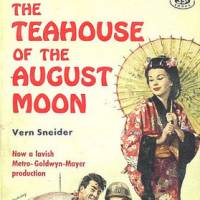Published in 1951 and later adapted for a movie and Broadway play, Vern Sneider's "The Teahouse of the August Moon" is a satirical take on the U.S. Occupation of Japan.
The Teahouse of the August Moon, by Vern Sneider.
282 pages
SIGNET, Fiction.
A former commander in postwar Okinawa, Sneider portrays the military government as paternalistic, tasked with establishing a Western-style society and instilling "a sense of responsibility in the people." However, the natives in one Okinawan village, Tobiki, take advantage of their new ruler, Capt. Fisby. They want Ginza kimonos and better tea, not a Women's League for Democratic Action.
Trouble starts when the bumbling Fisby is gifted two charming geisha, who need a teahouse built in which they entertain — a challenging feat in war-weary Tobiki. Enamored by Japanese culture and helped by his sidekick, the interpreter Sakini, Fisby ushers the village into a boom of economic industry. A bright future beckons, until a colonel visits, investigating rumors that the oddball Fisby has gone native.
Sneider's's voice is so calm and his pace so relaxed that his mischief goes nearly unnoticed: The army agenda is foiled, yet Fisby brings capitalism to the villagers. Trading their crafts for government rations, he gains local respect as he breaks army rules. At the risk of seeming naive, the novel never takes sides on the politics of Occupation — a blast from the past in our highly politicized times.



















With your current subscription plan you can comment on stories. However, before writing your first comment, please create a display name in the Profile section of your subscriber account page.